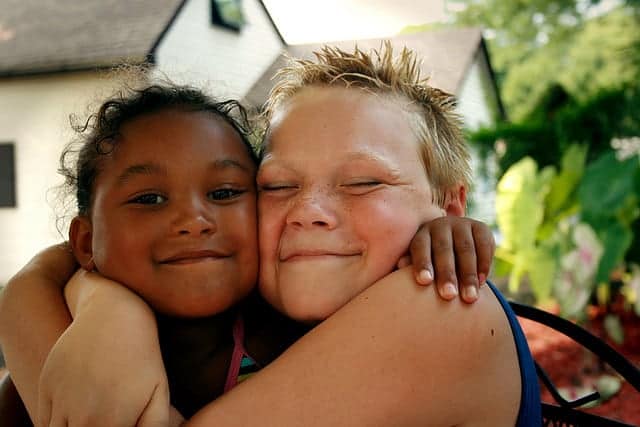"Often when you think you're at the end of something,
you're at the beginning of something else."
~ Fred Rogers
It's that time of year -- a time for learning to say healthy goodbyes to friends and teachers, acknowledging a mixture of emotions, reflecting on what we learned individually and as a community, and preparing for a new schedule as summer unfolds. We know that transitions of all kinds can create more instability and agitation in children. These are times when we adults need to pay particular attention to the social and emotional well-being of our kids. As we help our kids bring meaningful closure to their school year, we can also transition them into a summer routine that feels grounding. Here are a few suggestions from Rebecca Eanes of Positive-Parenting.org:
a. Whether your family's schedule is jammed packed this summer or purposefully slow and relaxed, the main ingredient to remember for a wonderful summer is connection. Being present and engaged with your children is going to fill their cup, and the joyful memories you make together will feel that much more special to them because they feel so very loved and connected to you. There are countless ways to connect, and it’s useful to know your child’s love language so that you can really speak directly to their hearts. Here are some ideas: Offer lots of hugs and cuddles. Make up a special secret handshake. Give lots of verbal affirmations. Write notes, cards, or letters to them. Read aloud. Play together. Send them mail. Commit to at least 30 minutes per day to give your child distraction-free attention and watch the relationship blossom.
b. Read great books together. Reading aloud provides key benefits that prepare children for reading and learning. The greatest amount of brain growth occurs between birth and age 5, but older kids benefit, too! My family loves piling in the car together (or on the couch) and listening to audiobooks. Even if you don’t take any trips this summer, your children can visit all sorts of places and live through many characters with books. Encourage your child to start a series and set aside reading time daily. It helps to create a special reading nook with pillows, blankets, and lights! There are tons of reading lists online to give you some ideas! Try readingrockets.org for lists divided by ages.
c. Pick one epic thing you’ve never done before. Have you ever camped out in the backyard? Have you gone to the zoo? Have you hiked all the trails in your area? Pick one thing that will make you child say, “Oh, that was the summer we…” This defining moment will make this summer stick out in their minds as one of the best ever. Need some ideas? Visit a nearby waterfall. Try out a trampoline park. Give ice skating a whirl. Host an incredible sleepover. Find a local carnival or festival. Search for free outdoor concerts. Watch a drive-in movie.
d. Don’t throw away your routines. Sure, you can adjust for summer and be a little more lax, but if the routines just disappear completely, you may see more meltdowns out of your kids. Dr. Laura Markham of ahaparenting.com says that routines give children a sense of security and help them learn self-discipline. Setting up a good summer routine will help you and your child feel more structured and allows you have a little more control over the chaos of summer break.
Wishing you and your family a precious summer!







